On Friday, January 30, 2015, I participated in ALSC’s Day of Diversity: Dialogue and Action in Children’s Literature and Programming (in collaboration with CBC Diversity). The goal was to “bring together leaders in children’s literature and literacy to discuss strategies for ensuring that all children have access to diverse literature and library programming.” It was an honor to be included among the 70 or so folks who have been working toward equity in children’s literature for years, and in many cases, decades. Also included during the day were 30 librarians who had applied to participate. Some of us were invited to present, some to moderate, some to facilitate, and some to attend. I was invited to facilitate one of the first breakout sessions – our task was to strategize on how to increase diversity in print and digital materials. My co-facilitators were Lesléa Newman, author of Heather Has Two Mommies (which is celebrating its 25th anniversary this March), and Wade Hudson, author, president and CEO of Just Us Books (the only publisher publishing Black-interest children’s books). I’m thankful to have been among so many smart and talented and hard working people.
Several friends have eloquently summarized and reflected on the event (Zetta Elliott, Debbie Reese, and Edi Campbell), so this is going to be more of a brief reflection than a summary. I think the general consensus was that it was wonderful to finally all be in the same room together, it was a great start, and we want to see how things will go from here. It was pretty evident that the first half of the day – what some of us called Square 1 or Diversity 101 – was more for the benefit of those who haven’t already been talking about these problems. The breakout sessions were opportunities to really start talking, but even then sometimes they turned into opportunities for self-promotion rather than strategizing for action. Cutting people off is hard. Still, I think we got some solid ideas at the breakout sessions, so I’m hopeful that we’ll be putting them into practice and effecting real change. Here are some of the ideas from my break-out session, in the order they were discussed:
- book fairs at non-library and non-bookstore spaces (such as community centers, churches, sororities, etc)
- send authors and illustrators into those unconventional spaces
- target advertisements to specific communities (do research on where specific communities tend to get their news, whether TV, radio, internet, etc)
- publishers should provide more resources on how to use particular books in the classroom and library
- look for, speak up about, and debunk myths in the media
- partner with Young Readers Center in Library of Congress
- bookstores and libraries can organize out-of-the-box events, such as cooking classes and summer camps (check out La Casa Azul Bookstore)
- empower local communities to partner more closely with libraries
- push for books that move beyond what Rudine Sims Bishop would label as a “social conscience book” and more toward books that depict the multidimensional aspects of experiences
- change curriculum in K-12 and higher ed (teacher education, LIS education, etc)
- Common Core reform
- build community esteem
- speak up about white-centered book covers
I found the lightning talks to be quite moving, particularly when Namrata Tripathi talked about the assumptions people make about her name and background (I LOVED how she ended her talk – “Instead of saying goodbye, I’m saying hello, my name is Namrata Tripathi, and I’m very pleased to meet you.”) When author Ellen Oh started talking about her Korean American family and history, I nearly died. I tweeted:
One reason why
@elloecho writes is for her Korean Am daughters. Bc she writes, my KA daughter has more to read. Thank you#DiversityMatters
But the one thing that many of us talked about during and after was the absence of particular conversations. We didn’t really talk about power or oppression or dominance or privilege in explicit terms. There was a politeness that was encouraged and for the most part, observed. As the saying goes, “Well behaved women seldom make history” (Ulrich). I’m not saying we should have been rude and out of place, but, invoking another saying, “Power concedes nothing without a demand. It never did and never will” (Douglass). Because the conference program was so carefully crafted, there wasn’t really an opportunity to demand that we talk about power and oppression and dominance and privilege. Sure, there were moments – Violet Harris pointed out that we’ve been having this conversation not for just a year or a few years but for decades; Pat Mora pointed out that the system needs to change; Camila Alire pointed out that the publishing numbers are getting worse… But it wasn’t until the very end, when Satia Orange exhorted us to DO SOMETHING because #BlackLivesMatter. I’m paraphrasing here, but she basically said that the system is not interested in letting diverse voices speak. They want to shut us down because they’re afraid of how things will go down when we’re numerically the majority in 2050. They want to keep us illiterate, voiceless, and powerless, and keeping our stories out of circulation is one way to do that.
You could hear a pin drop.
I wish we had started and ended with something like what Satia said. It was powerful and would have provided the right energy. That said, it was a terrific way to end the conference, and I, for one, walked away feeling even more affirmed that our work matters. Only time will tell what kinds of changes we’ll see in the future.
I tweeted most of these photos, but I’m posting them again anyway! Here we are, just before getting started…
The same cover, below, was used in Dr. Jamie Campbell Naidoo‘s white paper, The Importance of Diversity in Library Programs and Material Collections for Children (ALSC, 2014).
Notice the negatives… the number of diverse children’s books by and about particular populations has actually gone DOWN. Never mind that the CCBC does not evaluate the quality of these books. As Debbie Reese has often pointed out, it’s not enough to have 64 books about American Indians if many of them are horrible books.
Author/illustrator Gene Luen Yang talked about how these (and many other) graphic novels bust certain myths about non-white people as heroes. Side note: I read The Color of Earth/Water/Heaven trilogy right after giving birth to my daughter, and it was amazing.
The Diversity Gap infographic created by Lee & Low (part of the “Why Hasn’t the Number of Multicultural Books Increased in 19 Years” blog post from 2013) that so clearly lays out the fact that the number of diverse books has not changed in the past 20 years. Absolutely unacceptable.
Loved this – a cheat sheet on how to promote diverse books without making your sell about the characters’ race. For example, instead of “This is a book about a Native kid living on a reservation,” say “Can’t get enough of the Beatles? Neither can the author or the kid at the heart of this story. Friendship and rock n’ roll” for Eric Gansworth’s awesome novel, If I Ever Get Out of Here.
Pat Mora (founder of El día de los niños/El día de los libros – Children’s Day/Book Day) finally just laid it out – we need a diverse publishing system at all levels. It’s not enough to have diverse books written by diverse authors – they need to be edited by diverse editors (hurray to Namrata Tripathi for embracing her role!), marketed and promoted by diverse marketing and promoting departments (Remember the time I received a letter from an editor promoting a novel as “foreign” and “exotic”? Yeah, I’d like to forget that happened…), reviewed by diverse reviewers, awarded by diverse award committees, etc. The system has to change at every level.
After the conference, we enjoyed a reception at the Harold Washington Library, where Lesléa convinced us all to try a Twix bar that wasn’t a Twix bar and tasted a million times better than a Twix bar.
Sandwiched between Debbie Reese and Cynthia Leitich Smith (who is, I believe, one of the most animated and hilarious people I’ve ever met!!) at the We Need Diverse Books dinner. What else is there to say? It was an epic way to end the day.
It’s not a trip to Chicago unless you take your favorite friends to your favorite french toast restaurant. Closed out the weekend with author Zetta Elliott and author/illustrator Maya Christina Gonzalez – two crazy awesome award winning women whose books and other writings we should all read. For example, I always assign Zetta’s “Something like an open letter to the children’s publishing industry” alongside Laura Atkins’ “White Privilege and Children’s Publishing: A Web 2.0 Case Study.”
This is not The End. This is also not The Beginning. It’s a point along the continuum – it’s quite possibly a tipping point that, and as the We Need Diverse Books campaign has pointed out, “Now is the time to raise our voices into a roar that can’t be ignored.”
The industry – indeed, the world – can’t ignore the fact that the number of multicultural books has not increased in the past 20 years. It can’t ignore the fact that our society continues to diversify. It can’t ignore that publishing does not. It can’t ignore the fact that there are very talented authors and illustrators who make wonderful and amazing children’s books. It can’t ignore the fact that a lack of diverse books hurts ALL children. It can’t ignore the fact that we need to have these conversations, that we need to address these issues and talk them out and DO SOMETHING to CHANGE the system. And we can’t do it alone. Debbie Reese pointed out that she can’t fight racism re: Native Americans in children’s literature alone. None of us can do the work alone. We all have a stake, and we should all work to dismantle racism and promote equity in children’s literature.
Many of us – including those not mentioned here – are already at work, and now, more than ever, we need to STEP IT UP. Won’t you join us?
— Update 2015 February 3 —
Check out the following resources on ACTIONS we can take to increase diversity in children’s books and get diverse books into the hands of all readers:
- Elizabeth Bluemle’s post at Pub Weekly: “Diversity: One Thing YOU Can Do Now“
- The Birthday Party Pledge
- Letter writing campaign


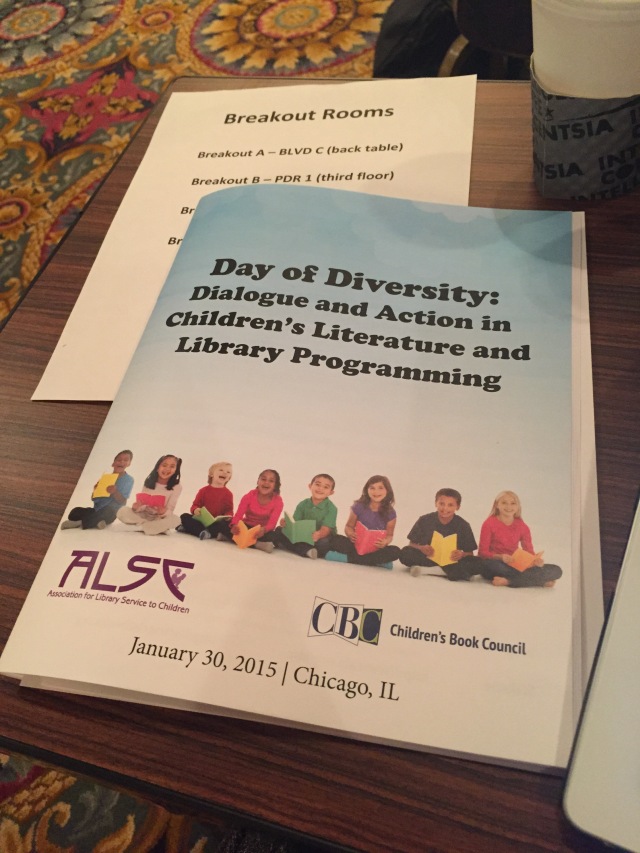

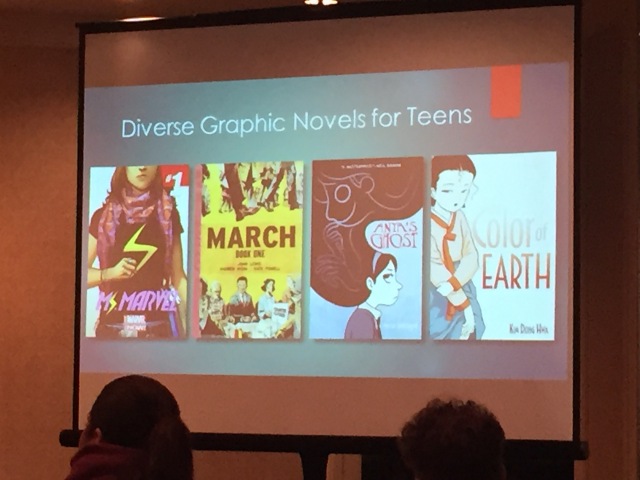
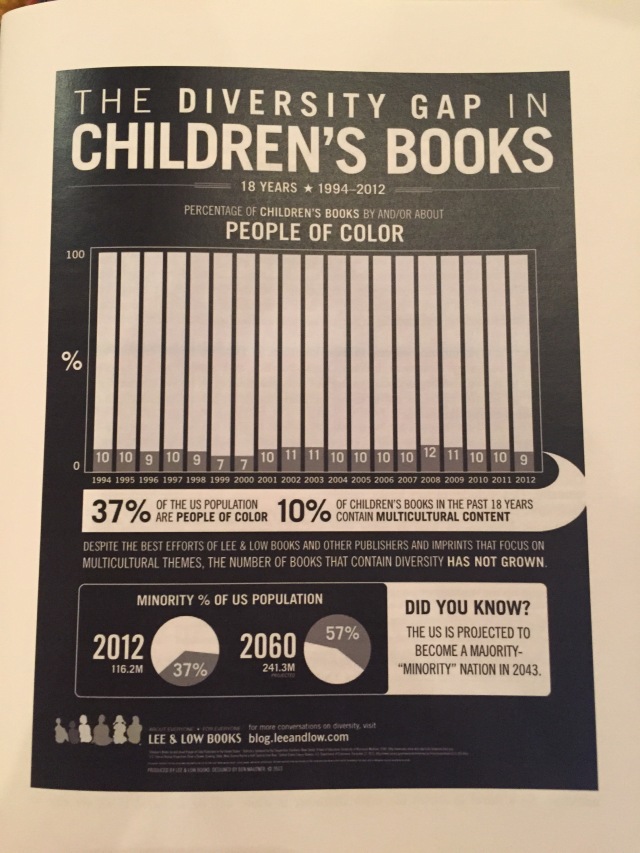


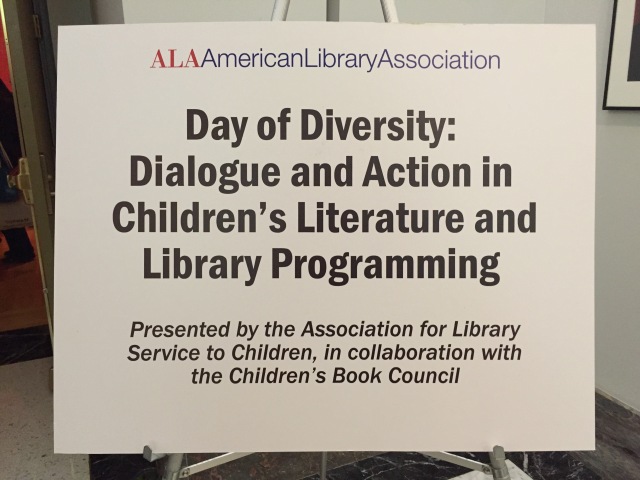
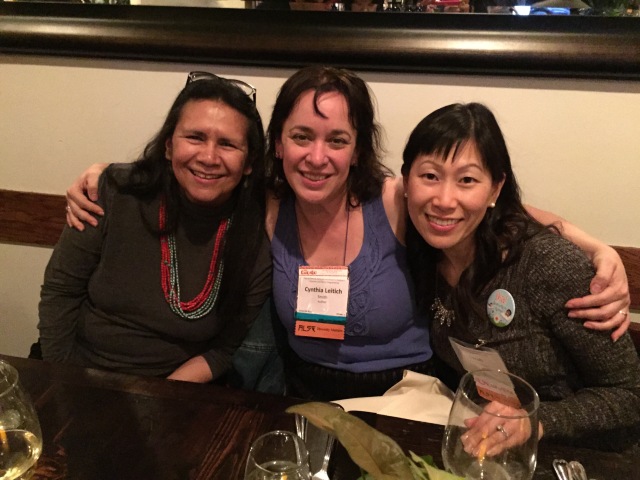
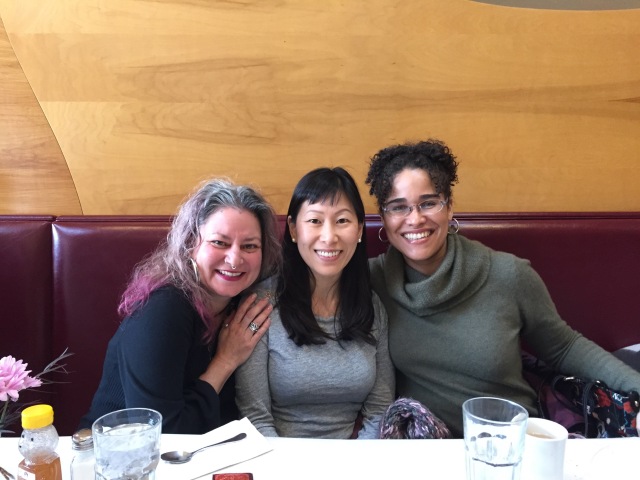
Hi Sarah,
I’ve read this twice now and will probably read it again. The day itself, accounts of the day, and the diversity of the awards yesterday, will help to extend the reach of the current interest in diversity. I particularly like that you note Satia’s words about the future. I was groping to capture them in my recap.
I was sitting a chair away from Sarah all day, that day, as I tried to take notes and tweet what people were saying. The best tweets were from Sarah. If you don’t follow her, do it now! She is particularly adept at capturing and sharing words and ideas.
Yes, I think we’ll all be reflecting for a long time, AND continuing to move forward in action.
I too, will read this again. I’m so thankful for the recaps from you, Debbie and Zetta (they’re the only ones I’ve read so far) so that my memory can be more full and so that as I move forward doing what I do, I know where I can turn. It was such a pleasure to meet you! Reading Namrata Tripathi’s closing made me realize that one of my regrets was not saying “Hello, my name is Edi” to everyone in that room. What a room that was to be in! My other regret is taking such poor notes, but then, you, Debbe and Zetta have helped with that. And so, we continue the work.
Namrata’s closing was so beautiful. And it was also such a powerful invitation.
Thank you for this, Sarah. The photos with numbers that are literally mind-numbing … how is it POSSIBLE that we have fewer books by people of color and First Nations peoples now than a few years ago?????? … the links to authors I previously didn’t know about, the analysis of what was missing, the joy in connecting with people and having discussions – I am so thankful that you were there and so appreciate that you and Debbie and others have taken the time to post about it so that the rest of us can see and feel some of it, and continue to be inspired to make and support change.
Amazing. Your capturing, and Debbie Reese’ especially, should be blasted everywhere. Thanks for the reminder that there is work to do, aggressively, importantly, with great discomfort so we can rise above the silent fray.
Pingback: A Frank Remembrance of My ALA Midwinter Experience | Latin@s in Kid Lit
Pingback: #WNDBchat THURSDAY NIGHT | We Need Diverse Books